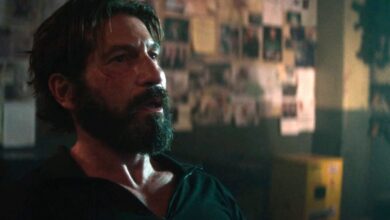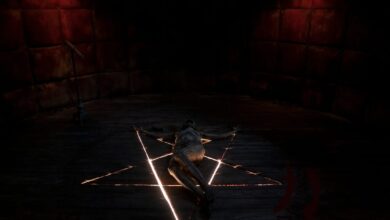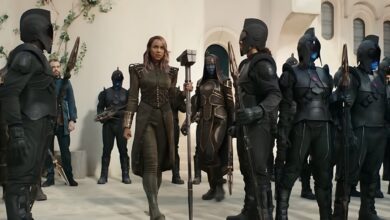The Matrix Revolutions Ending Explained: Who Was The Little Girl With The Oracle? How Neo Can Return In The Matrix 4?
The Matrix Revolutions is the latest film in one of the most important and most significant trilogies ever. Appeared in 2003, written and directed by Lana and Lilly Wachowski, the film has put a stop to the entire narrative structure of a work that has remained in the hearts of many. Kicks in mid-air, bullets stopped with the power of thought, duels worthy of note, thanks also to an epic music in the background, are some of the many aspects that we could hardly forget when we hear or talk about the Matrix.
You know, the Matrix is much more. The philosophical, literary, mythological and religious references are many, to the point that the entire saga has been analyzed from many points of view, offering a truly immense theoretical panorama. Almost worthy of an encyclopedic knowledge that transversally unites cinema to the culture chain (in the most generic sense possible).

Matrix Revolutions comes to the screens almost at the request of the same audience. The world wanted to know how the eternal struggle between the human and the machine would end, what we could really expect in the future (if we assume that the Matrix represents the future in which we will live). Although it was a title full of expectations, and as much as the film represents the child who is entrusted with the sacrifices of the parents, Matrix Revolution was received with coldness by both audiences and critics. Accomplices, perhaps, the previous chapters, the last work of the Wachowskis has not been able to meet the expectations that Matrix and Matrix Reloaded instead, they communicated to the public. However, although the criticism is divided between those who support the film and those who reject it, in this article we will offer an objective analysis, departing from what has already been said. Hoping, in our hearts, to pay homage to the work.
The Matrix Revolutions Plot
The entire narrative structure of Matrix Revolutions is articulated through a double track: the eternal struggle between humans and machines reaches its final point. The former gather in Zion, the capital, with the specific order to defend it at any cost. The machines, in fact, are about to attack with the intent of completely exterminating them.
Commanded by Jason Lock (Harry Lennix), aboard heavily armed anthropomorphic exoskeletons, the humans are ready to engage in the final fight against the sentries, terrifying cuttlefish-shaped machines. The battle that the two sides wage is terrible and bloody, but as long as only one man can breathe, Zion will have to be defended.
Neo (Keanu Reeves), on the other hand, wakes up in Limbo, an area isolated from both the Matrix and the real world, created and managed by the Man on the Train (Bruce Spence). He is a powerful man, faithful to the one and ancient entity of the Matrix: the Merovingian (Lambert Wilson). Trapped, Trinity (Carrie-Anne Moss) and Morpheus (Laurence Fishburne) decide to talk to him, with the intent of helping him. And, between one threat and another, the man agrees, thus managing to save Neo. However, as Chosen, his purpose has yet to be fulfilled. With the help of the Oracle (Mary Alice), discovers that Agent Smith (Hugo Weaving) is increasingly out of control; therefore, the main character’s goal will be to stop him before he takes possession of the Matrix. On board the Logos ship, assisted by his beloved Trinity, Neo manages to reach the City of Machines. Here he meets the Deus Ex Machina, to whom he promises a pact: in exchange for Smith’s elimination, the war against humans must end.
The Matrix Revolutions Ending Explained: Who Was The Little Girl With The Oracle?
Neo vs. Agent Smith . Without a doubt, it is the long awaited scene . Two men, whose fates have already crossed in previous chapters, now find themselves face to face in a final battle. Or rather, Neo has to deal with thousands of Smiths who have come to see their “boss” triumph. And they remain there, in a row, motionless, one identical to the other, with the hope of being able to carry out the coveted project: conquering the Matrix . The final battle, which sees Neo opposing Smith , occupies a particular position not only in the Matrix Revolutions, but within the entire saga. Both characters grow up, one becoming the mirror image of the other. Two sides of the same coin acquire certain theoretical characteristics that illuminate the viewer through truly brilliant speculations (or doubts). After all, the strength of the Matrix also lies in this.
Neo comes to challenge Smith after he has now extended his domain. Taking advantage of the war between humans and machines, Smith nearly infected the entire Matrix, thus ending his main goal: to homologate the world. Neo, as the Chosen One, offers the Deus Ex Machina to challenge him, as the machines cannot stop his unstoppable rise. So he enters the Matrix and, under an apocalyptic deluge, advances aware of his destiny (or maybe not yet).
Worthy of an epic poem, with a choral soundtrack accompanying the clash, Neo against Smith is the cinematic equivalent of an Achilles against Hector, an Aeneas against Turn, a Tancred against Clorinda. Each blow struck acquires a certain symbolic value, so that the gradual power of each one, in a parabolic process that culminates (and ends) with the crash to the ground, leaves room for the final discourse which claims to question everything on which one is so far speculated.
Neo versus Smith is not just the fight of the Chosen versus the Non-Chosen. It is not only the final call of a destiny already marked and written. It is the ending point of a story, which becomes, however, an “ea-to-head” if we carefully hear Smith’s words when he says: “Everything that has a beginning has an end, Neo”. Smith, then, seized by a strange fear, assimilates Neo, leading, however, to a reboot of the same Matrix. Then it is the Agent himself who vanishes in an explosion, destroying everything he had created.
Who Is The Chosen?
The long-awaited prophecy is fulfilled. But who is the one who really realizes it? Neo, allowing himself to be assimilated because he is aware that the Smith program can be permanently eliminated from within? Or is it Smith himself who, unaware, does not evaluate a variant of his ” Matrix control equation ” and razed all his creation to allow a restart of the same program?
And so, in the end, who is the real Chosen? Here, Matrix Revolutions manages to unhinge thousands of theories that were created with the vision of the respective films of the trilogy. The Chosen One is described as a subject born in the Matrix, when there was some sort of archetypal version of the same software. Neo, on the other hand, is a human who enters the Matrix and is presented as Chosen by Morpheus. The Oracle, which we remember sharing with the Architect (Helmut Bakaitis) the genesis of the Matrix, never explicitly states that Neo is the Chosen One. And much less denies it. So is it all a reverse psychology game? Neodid he need a stimulus to stop his antagonist, since the Matrix, having been created by humans, can be destroyed by a human hand?
The final confrontation we witness in the last film is a tear in Maya’s veil. It is a continuous creation of doubts and questions that are difficult to confirm, unless you embark on a rewatch of the entire saga, trying to concretize the respective theories.
War Against The Machines
If the fight between Neo and Smith is the deepest part of Matrix Revolutions, on the surface we see the ultimate battle between humans and machines. As mentioned above, humans are called to defend Zion, their capital, and armed on anthropomorphic exoskeletons they engage in a fierce battle against cuttlefish, lethal machines that manage to breach their defenses. The fight becomes pitched from the very first moments. It is a continuous crescendo of emotions that affect every man or woman who holds a gun. Anxiety, anger, fear, strength: everything mixes in a whirlwind of hope so that the human race survives and does not perish to the enemy-machine.
The screams leave room for dialogues, speeches always poised between concern and the desire to move forward at any cost. Every blow is fundamental, just as every mistake can be lethal for the whole of humanity. Anyone of flesh and blood in Revolutions holds onto something to believe in, whether it’s the infamous Chosen or not. In any case, at the top of it all is hope, a word that, accepted with skepticism or not, swells the breasts of all those who prefer to live . As if it were a breath of life, hope reminds us how important we are.
Matrix Revolutions Explanation?
Certainly it is difficult to understand this third film, without having first seen the two previous ones. Anyway we try to explain the ending of Matrix Revolutions, which is also the ending of the trilogy.
If in the first movie Neo had defeated Agent Smith, who should have been canceled, he actually survives the cancellation and returns to the system. He creates copies that infect other agents (in the second film) and the situation worsens precisely in the Matrix Revolutions, when Smith assimilates critical programs, including the Oracle. Smith also manages to infect a human being and Neo understands how the machines are now doomed, because Smith is practically capable of destroying anything, even humans themselves.
During the fight with Agent Smith, Neo loses and is imprisoned in a copy of Smith himself who appropriates his powers. To break free, he uses his ability to destroy the agent but from within. Since the copies of Agent Smith all have the same power, they are destroyed in the same way. This causes them all to self-destruct.
When Neo dies, the machines withdraw the troops and, in the final scene we see how the architect, while not approving, is forced to accept the situation. The Oracle hints at having organized everything, both Neo’s powers and Smith’s revolt, because he intended to arrive at that very moment, although it was a very dangerous situation and potentially capable of destroying machines as much as humans.
Basically, in the fight with Smith, Neo realizes that the only way to end the war is to kill both himself and Smith, to restore balance to the program. At the end of the fight, in fact, the machines retreat and the Matrix is restarted, starting a new era of peace.





